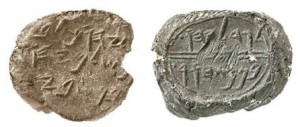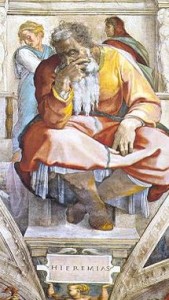Yirmiyahu ben Hilkiah (c. 6th century BCE), better known as Jeremiah, was born to a family of Kohanim in Anathoth, Israel towards the end of the First Temple period. As the Kingdom of Judah descended into more and more sin, the righteous Jeremiah began receiving divine revelations prophesying the destruction of Jerusalem and the captivity of the Jewish people by the Babylonians. Although Jeremiah was very young, and did not want to take up the calling of a prophet, he nonetheless followed God’s direction to warn the people of their impending doom, and to inspire them to repent. Unfortunately, the people chastised Jeremiah and he was imprisoned for his teachings. Jerusalem was indeed destroyed, and the people exiled to Babylon. Jeremiah captured these events in his Book of Lamentations (Eichah), and recorded his prophecies in the Book of Jeremiah (written by his scribe Baruch). He is also credited with composing the Book of Kings, making him the author of three of the 24 books of the Tanakh, the Hebrew Bible. After prophesying to five kings of Judah, and surviving the destruction of the Temple, Jeremiah lived out the rest of his life in Egypt. Jewish texts compare Jeremiah to Moses, and he is also honoured as a prophet and holy man by Christians, Muslims, and the Bahai.

Archaeologists have discovered official clay seals bearing the names of Yehuchal and Gedaliah ben Pashur, two of the king’s ministers that opposed Jeremiah and imprisoned him, as recounted in the Bible. Gedaliah ben Pashur should not be confused with the righteous Gedaliah ben Ahikam (Credit: Gaby Laron, The Institute of Archaeology, The Hebrew University.)
One of the leaders that Jeremiah supported was Gedaliah ben Ahikam, who was appointed by the Babylonian king Nebuchadnezzar to govern the Judean province after Jerusalem’s destruction, and to facilitate the rebuilding of Israel with the small group of Jews that were not exiled. Gedaliah successfully inspired the people to reestablish their farms and vineyards, rebuild their homes, and to inspire many other Jews who fled before the war to return. Sadly, Gedaliah was assassinated on Rosh Hashanah. Fearing another uprising and the response from King Nebuchadnezzar, the Jews of Israel fled to Egypt, despite Jeremiah’s insistence that God would protect them. This essentially left the land nearly devoid of any Jews for the next several decades, until the end of the Babylonian empire at the hands of the Persians, and the ensuing end of the Jewish exile. To mark the tragedy of the righteous Gedaliah’s assassination, and the temporary end of the Jewish presence in the Holy Land, the day after Rosh Hashanah (today) is observed as a fast day, known as the Fast of Gedaliah.
Words of the Week
Of everything G‑d created in His world, not one thing was created without purpose.
– Talmud, Shabbat 77b

